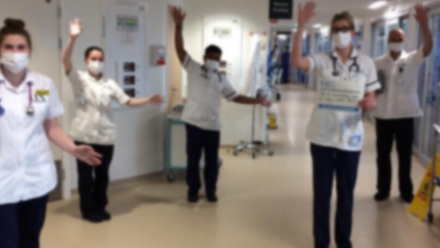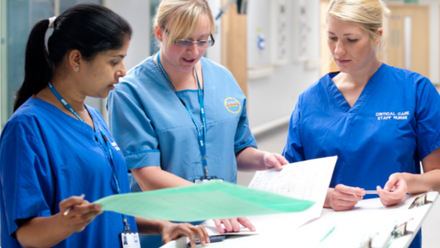My name is Zoe van Willigen, and I’m one of the ten members of the Physiotherapy Professional Advisory Group (PPAG) for the Intensive Care Society. We were elected back in 2022 so this blog gives an update about what we’ve been working on since then, and what our plans are for the coming year.
Firstly, I’d like to tell you a bit about us as a group. On a zoom screen we might not seem like the most diverse of individuals (!), but we actually represent much of the incredible breadth of physiotherapy expertise within critical care. Between us we have roles as clinical academics, researchers, university lecturers, practice educators, POCUS mentors, clinical leaders, published authors, advanced clinical and consultant practitioners with a whopping 157 years of combined critical care experience! We have a range of specialist skills as a group, including ECMO, SIM training, ventilation and weaning, tracheostomy care, complex airway clearance, non-medical prescribing, and rehabilitation after critical illness. Many of us also hold positions within other key stakeholder groups such as BTS, NCEPOD, NHSE/PHE, NICE, CSP and ACPRC.
Two major pieces of work over the last year for our PPAG have been collaborating to develop the multi-professional streams of the State of the Art (SOA) congresses, and writing a supplementary physiotherapy pillar for the Society’s ‘AHP critical care professional development framework (CCPDF)’:
Contributing to the SOA congress has been a fantastic way for us to raise the profile of physiotherapy within the Society and wider critical care audience – one of the key objectives for our PPAG. Making SOA more accessible for all professions is extremely important to us – if we learn together as a team we will work well together as a team out in clinical practice. Ensuring the SOA is inclusive of the multi-professional team will only help to increase our membership too – another key objective for us.
The AHP CCPDF is a robust piece of work that we wanted to make more user-friendly. So, rather than create a whole new pillar we have developed supplementary material with case studies and vignettes that critical care physiotherapists can relate to. We consulted with our colleagues to ensure that these worked examples were reflective of the various roles that can be found within critical care. Now this physiotherapy supplement can be used alongside the core AHP CCPDF document, to map both achievements and learning needs for annual appraisals and career development. We are really excited for the publication of this supplement, planned for the coming months. Please keep an eye out for its release!
Our PPAG members are also involved in the Society’s working groups and committees. As chair of the PPAG, Becky Haylett is highly motivated and committed to representing the profession within the Society, in collaboration with the other PAGs and various partner organisations. Our education and learning representative Ema Swingwood (OBE) is working with the Society’s education committee to develop short courses for the multi-professional team. Ema is currently finalising plans for an airway clearance study day in October 2023 which is relevant and open to all – the agenda looks amazing, watch this space! Our PPAG have recently contributed to the joint ICS/BTS guidance on Respiratory Support Units – its key that these are collaborative multi-disciplinary documents to ensure that they can be easily and realistically adopted into clinical practice. Nicola Morgan is our representative on the Standards and Guidelines committee and Allaina Eden is our PPAG deputy chair as well as representing us on the Environmental Sustainability working group. Deb Dykes represents us on the Society’s Membership committee, while Helen Sanger, Laura Jenions, Clare Wade, and Abi Oliver have all been part of the core work of the PPAG this year. Later this month, Ema, Allaina and I are looking forward to producing a podcast for the Society, exploring issues surrounding the physiotherapy workforce in critical care.
Our key aim for the forthcoming year is working towards clarifying safe staffing levels for AHPs on critical care. We want to provide opportunities to allow AHPs to have access to post graduate learning and have been working with CC3N and HEE on how we achieve this. Workforce remains a significant challenge in the current climate, due not only to the rising complexity of our patients but also to challenges in recruitment and retention of experienced physiotherapists. In order to ensure adequate delivery of services in the future we need to increase educational opportunities for physiotherapists in critical care, ensuring that there is a structure in place for those who wish to progress their careers clinically. We are looking forward to further working with our colleagues across the country to this end, and in parallel advancing the discussion about how to best quantify physiotherapy demands and the impact of physiotherapists within critical care.
I think I can speak for all of us when I say that I feel very fortunate to work with such an inspiring group of clinicians both within our PPAG and the Society as a wider multi-professional team, who are all an incredible source of peer support. Times might be tough but as physiotherapists we are trained motivators, and our PPAG are excited to continue to motivate not only our patients but also our profession and the Society to keep progressing, developing and achieving. We would be really keen to hear from you if you would like to know more about the PAG, the work of the Society, or have ideas as to how we can best support you. Please contact us via [email protected].


